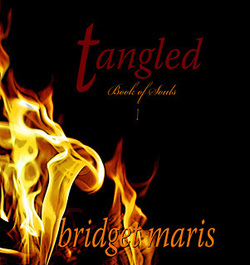
* * *
I received a free copy of this book in exchange for an honest, nonreciprocal review. *Spoilers*
Overall, Tangled was well written, made smart use of the character’s thoughts and dialogue to give what seemed to be accurate insight into the ways of teens, and offered some bits of wisdom for young readers. The occasional grammatical or editing error could be easily corrected and took nothing from the story, nor did such color my review. The story moved along and kept me engaged, though admittedly, never at the edge of my seat, or with a deep longing—an itching need—to know what would come next.
To avoid the pain of having been dumped by her boyfriend, Rachel sells her soul after admitting that she would do anything—anything—to avoid the pain she is feeling. The “anything,” it turns out, was more than Rachel could have anticipated.
The aspect of the story I found most difficult was the idea that Rachel felt “whole” only when she had a boyfriend. She goes from the arms of Justin, to the arms of Timothy, with little introspection about why she feels the need to do so. Perhaps it is common for teens to behave thusly. (?) Even so, Rachel’s neediness was a bit much. For example, Rachel and Timothy each concede to the other that they couldn’t live without the other. Yet, wasn’t it exactly that idea that had landed Rachel in the spot she was in? Since Rachel seemed a bright girl, able to talk to others and to help them to see ways out of situations in which they felt helpless and weak, I might have expected Rachel to discover her own strength and to acquire, along the way, the knowledge that she could stand on her own. Without that, Rachel remained vulnerable to making the same bad choice the next time around. It was probably this factor more than any other that lead me to rate Tangled as I did.
That said, Maris captured the spirit of “teendom” well. It was the little lines that convinced me that Rachel and her schoolmates were teens—and as to this point—hat’s off to Maris! That is not easily done! Here are just a few examples, out of some of the early pages, of the ways in which Maris did this: the description of the mess in Rachel’s locker; the thoughtless way in which the self-absorbed Justin dumped Rachel on the first day of the new school year; the way Rachel went down the senior hall just to try to catch a glimpse of Justin; the way Rachel grasped at anything Justin said to her as evidence that he still cared; Rachel’s acknowledgement of the figure of the girl, who now was Rachel’s competition, that could have “been on a magazine;” how Rachel’s mother’s chocolate chip pancakes—the very ones Rachel once had loved—now made her roll her eyes; how Rachel’s mother “just didn’t get it;” and so on.
Good job, Maris!
Learn more about TANGLED here.
I received a free copy of this book in exchange for an honest, nonreciprocal review. *Spoilers*
Overall, Tangled was well written, made smart use of the character’s thoughts and dialogue to give what seemed to be accurate insight into the ways of teens, and offered some bits of wisdom for young readers. The occasional grammatical or editing error could be easily corrected and took nothing from the story, nor did such color my review. The story moved along and kept me engaged, though admittedly, never at the edge of my seat, or with a deep longing—an itching need—to know what would come next.
To avoid the pain of having been dumped by her boyfriend, Rachel sells her soul after admitting that she would do anything—anything—to avoid the pain she is feeling. The “anything,” it turns out, was more than Rachel could have anticipated.
The aspect of the story I found most difficult was the idea that Rachel felt “whole” only when she had a boyfriend. She goes from the arms of Justin, to the arms of Timothy, with little introspection about why she feels the need to do so. Perhaps it is common for teens to behave thusly. (?) Even so, Rachel’s neediness was a bit much. For example, Rachel and Timothy each concede to the other that they couldn’t live without the other. Yet, wasn’t it exactly that idea that had landed Rachel in the spot she was in? Since Rachel seemed a bright girl, able to talk to others and to help them to see ways out of situations in which they felt helpless and weak, I might have expected Rachel to discover her own strength and to acquire, along the way, the knowledge that she could stand on her own. Without that, Rachel remained vulnerable to making the same bad choice the next time around. It was probably this factor more than any other that lead me to rate Tangled as I did.
That said, Maris captured the spirit of “teendom” well. It was the little lines that convinced me that Rachel and her schoolmates were teens—and as to this point—hat’s off to Maris! That is not easily done! Here are just a few examples, out of some of the early pages, of the ways in which Maris did this: the description of the mess in Rachel’s locker; the thoughtless way in which the self-absorbed Justin dumped Rachel on the first day of the new school year; the way Rachel went down the senior hall just to try to catch a glimpse of Justin; the way Rachel grasped at anything Justin said to her as evidence that he still cared; Rachel’s acknowledgement of the figure of the girl, who now was Rachel’s competition, that could have “been on a magazine;” how Rachel’s mother’s chocolate chip pancakes—the very ones Rachel once had loved—now made her roll her eyes; how Rachel’s mother “just didn’t get it;” and so on.
Good job, Maris!
Learn more about TANGLED here.


